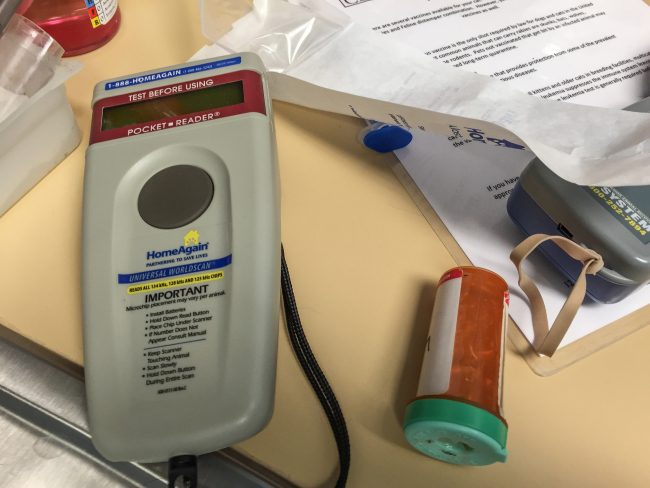|
Getting your Trinity Audio player ready...
|

With the uptick of people in Sweden implanting technology in their bodies, it causes one to ponder the Biblical ramifications. Christians around the world see the writing on the wall.
“And he requires everyone – small and great, rich and poor, free and slave – to be given a mark on his right hand or on his forehead, so that no can buy or sell unless he has the mark: the beast’s name or the number of his name.” Revelation 13:16-17 (Holeman)
They call themselves “body hackers.” They are the people “who push the boundaries of implantable technology to improve the human body.” The movement has evoked visceral reactions and raised questions about safety and ethical concerns. It also seems to blur the lines between cyborg and human.
Amal Graafstra is a pioneer body hacker. He uses his own body for experimentation. He designed bio-safe magnets and the microchip he implants.
The implantable RFID chips hold encrypted information. Additionally, the chip’s unique ID numbers allow them to open doors and unlock the owner’s smartphone.
Thousands have volunteered to have the RFID chip implanted to speed up their daily routines and make their lives more convenient. Aside from accessing their homes, gyms, and offices, the chip can be used to store emergency contacts, e-tickets for events, social media profiles, and railroad trips within Sweden.
The chip is smaller than a grain of rice and is typically inserted under the skin just above the thumb. The chip is implanted with a syringe similar to those used for vaccinations. This procedure costs $180.
So many of the Swedish people want these microchips that the main chipping company in Sweden cannot keep up with the number of requests. Biohax International is dominating the chip market. It was started five years ago by Jowan Osterlund, who is a former body piercer.
Osterlund worked fulltime on the project for two years. Now, he is developing training materials so Swedish doctors and nurses can take some of the heavy workloads.
So far, over 4,000 Swedes have implanted the technology. Osterlund says it does not make sense to have different cards and things to verify identity to several different systems is overwhelming. The chip means streamlining hyper-connected surroundings.
“Swedes are very pragmatic, and the chip is useful … and since a lot of people know each other in the tech community – it’s very tight – [the trend has] been spreading and people have seen the benefits,” according to Eric Frisk, who is a web developer and designer. He had his chip implanted in 2014.
When Frisk moved into his shared home early in 2018, he held a chip party for his housemates. Not they can all access the 16th-century building by tapping their hands on the digital reader next to the front door.
The chip helps Szilvia Varszegi gain access to her co-working space. She also uses it to share her LinkedIn information at networking events. This takes care of the never-ending need to spell her name. All she has to do is touch an attendee’s smartphone to transfer the information.
“When another phone reads the chip, they see the [link] and they can open it in the phone browser.”
The largest train company in Sweden allows commuters to use their chips instead of tickets. The chips could soon be used in restaurants and shops to pay for purchases.
Varszegi says the chip could easily be mainstreamed and make people’s lives better.
According to Osterlund, there are two primary reasons microchips are so popular in Sweden. First, Sweden has a history of embracing new technology before others and the country is quickly moving to become a cashless society. Second, the residents in Sweden are not as concerned about data privacy as people in other countries. There is a higher level of trust for Swedish companies, large organizations, banks, and government institutions.
Swedes are used to sharing personal information. Several administrative bodies require social security numbers for online purchases. Mobile phone numbers can be easily searched in online databases. People can even find someone’s salary by calling the tax authority. Very little information in Sweden is truly personal.
“Everything is hackable. But the reason to hack them will never be bigger because it’s a microchip. It’s harder for someone to get to, since you put it in you,” according to Osterlund, microchips are safer.
Revelation 14:9-11 says, “And a third angel followed them and spoke with a loud voice: “If anyone worships the beast and his image and receives a mark on his forehead or on his hand, he will also drink the wind of God’s wrath, which is mixed full strength in the cup of His anger. He will be tormented with fire and sulfur in the sight of the holy angels and in the sight of the Lamb, and the smoke of their torment will go up forever and ever. There is no rest day or night for those who worship the beast and his image, or anyone who receives the mark of his name.”
This author is not saying that the chip in Sweden is the Mark of the Beast, however, these two scriptures would be enough so that this author would not take the chance.
Osterlund says that people who are the most comfortable with technology are the least apprehensive about the current and future state of technology.
Only one in four people in Sweden use cash at least once a week. Additionally, according to Riksbank, the proportion of retail transactions has dropped from 40 percent, in 2010, to 15 percent today.
By Jeanette Smith
Sources:
NPR: Thousands Of Swedes Are Inserting Microchips Under Their Skin
NPR: ‘Body Hacking’ Movement Rises Ahead Of Moral Answers
Dave Dodges The Common Sense Show: Swedes Are Taking the Mark of the Beast In Great Numbers
Image Courtesy of Tony Webster’s Flickr Page – Creative Commons License



